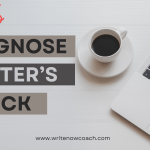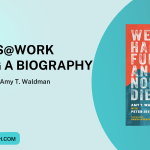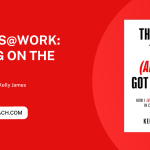Writers@Work: Beth Groundwater on Writing Mysteries
Beth Groundwater is known for her cozy mystery series featuring gift basket designer Claire Hanover (A Real Basket Case and To Hell in a Handbasket) This month, Groundwater released, Deadly Currents, the first book in what promises to be an absorbing new series. The series introduces seasonal river ranger Mandy Tanner, who works a stretch of the Arkansas River in Colorado. Tanner grew up in the area and learned the trade as a whitewater rafting guide for her uncle’s rafting company. As the book opens, Gonzo Gordon—one of her uncle’s guides—is maneuvering a raft over a dangerous section of the rapids. Several people are washed overboard and Tanner rescues two of them but only one lives. The deceased was a rich land developer who was fighting with business rivals over a valuable piece of land with valuable river rights. It’s not long before we learn that King was murdered and Tanner tries to figure out who did the dirty deed before the news hurts her uncle’s business. The mystery also features Tanner’s hunky boyfriend, Rob Juarez (who owns a competing whitewater rafting company) and her best friend Cynthia, who shares a dumb blonde joke every time she appears.
Highlights from the interview
How did you get into writing?
I started writing adventure stories in fifth and sixth grade and they starred a boy named Freddy because back then girls did not have adventures or so I thought. But now, I do not have that problem. My women protagonists have all kinds of adventures.
I started with short stories and in 99 I drafted by first novel-length manuscript and that has never been published. That has been my practice manuscript. It is now what we call a trunk book. It sits in a trunk!
A Real Basket Case was the second novel-length manuscript that I wrote. Since then, every book that I’ve written has been contracted for. So, I’ve been lucky in that.
Tell me about your process for writing a mystery novel?
It used to take me a year to write a book and that has been pretty much my average. But now I am on a contract schedule where I have to write a book every eight months. . . . I usually go through three stages. The first stage is two to three months of planning the book. I will do research, I will develop character profiles for all the main characters, and I will put together a scene-by-scene outline. Being a former software engineer, I engineer my mysteries. I have to know what is going to happen when and how the different scenes lead into each other. Once I have all of those elements together and I know where I am going, I will then spend three to five months writing the rough draft and that’s a very difficult thing. Yet, you just have to put your butt in the chair and write those words. I give myself daily and weekly word count goals or page goals and try to stick to those goals until I’ve got that rough draft cranked out. And then I’ll spend three to four months editing with my critique group—running chapters through my critique group, both editing before and after they see the pages. And then doing some full manuscript passes after they have finished giving me their feedback. And then I turn it in to the editor and then we begin the editing process with the editor. That’s the process.
How do you generate ideas for your books?
Usually while I am writing the previous book, I start to get ideas for the next book. And I will just throw those random thoughts into a file so that they’re written down and I can get them out of my head and I can continue with my current book. Then, I will go back to that file. I usually start with the victim—some interesting way that somebody dies and go out from there to find different people in their lives that might want to kill them because they are mad at them in some way. And that is how the plot gradually grows out of that. My two protagonists from my two series are pretty much defined—I know the basic settings and personalities of the sleuth so in each book I start with the victim.
What are the elements that you have to engineer when you write a mystery?
Well you have to have at least one person who dies and often two or three extra people who end up dying further into the mystery. You have to have 4-6 suspects and if you are going to kill one of them off later, you might want to go with the higher end of that. Because you want to have enough so that the reader is constantly wondering, “All right, I wonder which of these suspects might really have been the one who did it?” Each of the suspects has to have at least two of the three things that someone who commits murder is supposed to have. That’s means, motive, and opportunity. Motive is the reason they want to kill this person. Opportunity is that they were there at the time and place or close to the time and place where the person was killed. And means is that they had access to the murder weapon. So you give each of your suspects at least two of those three and then you have a number of clues and red herrings. And red herrings are false clues that maybe point to the wrong person. And the same thing can be a clue for one suspect and a red herring for another. So you try to have at least five to six of those and you engineer those so they point to two or three different suspects. And maybe the sleuth finds out something more about that clue later on that narrows it down. And each of those elements—the sleuth discovering who the suspects are and discovering the clues—ends up being translated into scenes in the whole plot structure. And you want to organize your scenes—the way I think of it is I am slowly peeling the onion, slowly taking one layer of the story off at a time to show different pieces to the reader until they get to the point that they and the sleuth can solve the puzzle.
What are some of the things you tell new mystery writers?
I am a firm believer in networking with other writers. I think that helps you to learn the business and the craft of writing and helps you make contacts that you are going to need later on in your career. So I tell beginning writers that you should be joining three groups. One is the professional group for your genre so that you start thinking of yourself as a professional writer in that genre. I am a member of both Mystery Writers of America and Sisters in Crime. . . . The second is to join a local writing organization that has meetings about various topics on the craft and business of writing. In my case, I am the member of two—Pikes Peaks Writers that meets in Colorado Springs and Rocky Mountain Fiction Writers that meets in Denver. . . . And then the third and probably the most important is to find a small group—say five to six people—that are fellow writers where you meet once a week or twice a month . . . to review chapters submitted to the group and get feedback from other writers. Just to give you an idea, my group started about ten years ago with five brand new amateur writers. None of us had been published or had a clue about what we were doing. And now those five people—we’ve had some changes, people have come and left—but of those five originals, three are published in book length fiction, three are published in short stories, and all five have won or placed in writing contests. So we helped each other improve. And I think that’s as good an ad as I can make for joining a critique group.
What other advice do you give to new writers so we don’t end up with 20 books in a trunk.
Well if you are interested in writing mysteries, let me give you some books that I would recommend. One is James Frey . . . and he has a book, How to Write a Damn Good Mystery. And another I would recommend is Chris Roerden. She is an editor who edits a lot of mysteries, and her book is, Don’t Murder Your Mystery. I also recommend Christopher Vogler’s The Writer’s Journey. I’d also recommend Debra Dixon’s Goal, Motivation, and Conflict.
For the rest of our interview, check out the recording on the Always Write page of the Write Now! Coach web site.
I look forward to the conversation. I’ll be away all day at a writing conference, but hope to check in later this afternoon!
Rochelle














